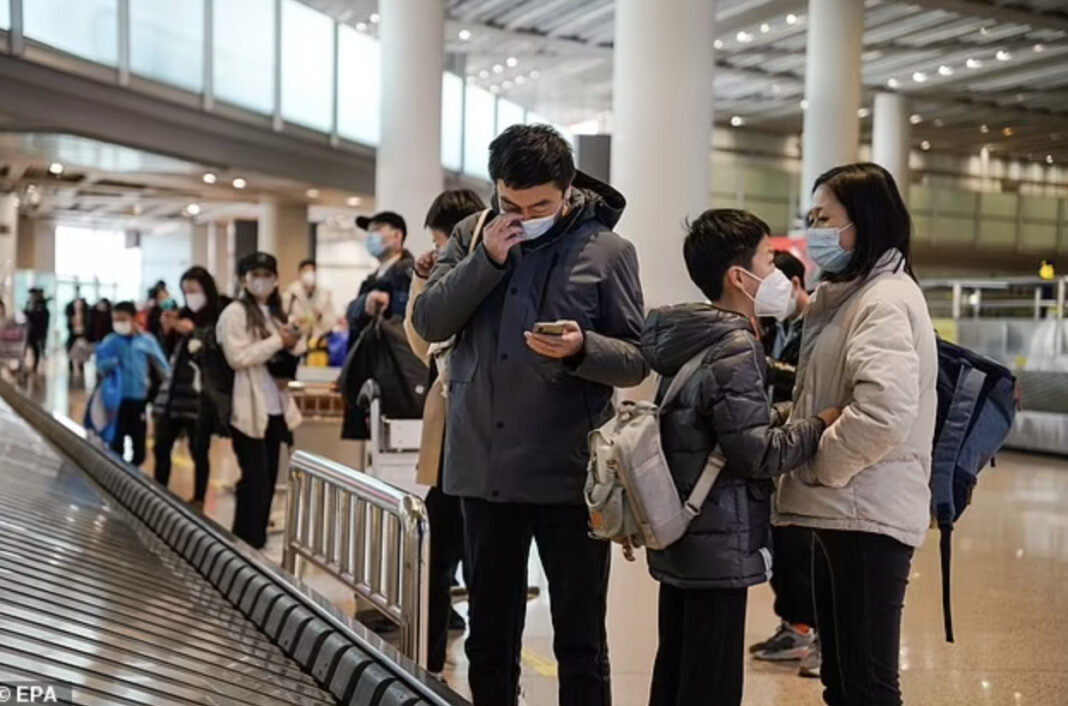The U.S. recommended Americans reconsider traveling to China because of arbitrary law enforcement and exit bans and the risk of wrongful detentions.
No specific cases were cited, but the advisory came after a 78-year-old U.S. citizen was sentenced to life in prison on spying charges in May.
It also followed the passage last week of a sweeping Foreign Relations Law that threatens countermeasures against those seen as harming China´s interests.
China also recently passed a broadly written counterespionage law that has sent a chill through the foreign business community, with offices being raided, as well as a law to sanction foreign critics.
‘The People´s Republic of China (PRC) government arbitrarily enforces local laws, including issuing exit bans on U.S. citizens and citizens of other countries, without fair and transparent process under the law,’ the U.S. advisory said.
‘U.S. citizens traveling or residing in the PRC may be detained without access to U.S. consular services or information about their alleged crime,’ it warned.
The advisory also said that Chinese authorities ‘appear to have broad discretion to deem a wide range of documents, data, statistics, or materials as state secrets and to detain and prosecute foreign nationals for alleged espionage.’
It listed a wide range of potential offenses from taking part in demonstrations to sending electronic messages critical of Chinese policies or even simply conducting research into areas deemed sensitive.
Exit bans could be used to compel individuals to participate in Chinese government investigations, pressure family members to return from abroad, resolve civil disputes in favor of Chinese citizens and ‘gain bargaining leverage over foreign governments,’ the advisory said.
Similar advisories were issued for the semi-autonomous Chinese regions of Hong Kong and Macao. They were dated Friday and emailed to journalists on Monday
The U.S. had issued similar advisories to its citizens in the past, but those in recent years had mainly warned of the dangers of being caught in strict and lengthy lockdowns while China closed its borders for three years under its draconian ‘zero-COVID’ policy.
China generally responds angrily to what it considers U.S. efforts to impugn its authoritarian Communist Party-led system. It has issued its own travel advisories concerning the U.S., warning of the dangers of crime, anti-Asian discrimination and the high cost of emergency medical assistance.
China had no immediate response to the travel advisory on Monday.
Details of the accusations against the accused spy John Shing-Wan Leung are not available, given China´s authoritarian political system and the ruling Communist Party´s absolute control over legal matters. Leung, who also holds permanent residency in Hong Kong, was detained in the southeastern city of Suzhou on April 15, 2021 – a time when China had closed its borders and tightly restricted movement of people domestically to control the spread of COVID-19.
The warnings come as U.S.-China relations are at their lowest in years, over trade, technology, Taiwan and human rights, although the sides are taking some steps to improve the situation.
U.S. Secretary of State Antony Blinken made a long-delayed visit to Beijing last week and Treasury Secretary Janet Yellen is making a much-anticipated trip to Beijing this week. China also recently appointed a new ambassador to Washington, who presented his credentials in a meeting with President Joe Biden at the White House.
Other incidents, however, have also pointed to the testiness in the relationship. China formally protested last month after Biden called Chinese leader Xi Jinping a ‘dictator,’ days after Blinken’s visit.
Biden brushed off the protest, saying his words would have no negative impact on U.S.-China relations and that he still expects to meet with Xi sometime soon. Biden has also drawn rebukes from Beijing by explicitly saying the U.S. would defend self-governing Taiwan if China, which claims the island as its own territory, were to attack it.
Biden said his blunt statements regarding China are ‘just not something I´m going to change very much.’
The administration is also under pressure from both parties to take a tough line on China, making it one of the few issues on which most Democrats and Republicans agree.
Along with several detained Americans, Two Chinese-Australians, Cheng Lei, who formerly worked for China´s state broadcaster, and writer Yang Jun, have been held since 2020 and 2019 respectively without word on their sentencing.
Perhaps the most notorious case of arbitrary detention involved two Canadians, Michael Kovrig and Michael Spavor, who were detained in China in 2018, shortly after Canada arrested Meng Wanzhou, Huawei Technologies´ chief financial officer and the daughter of the tech powerhouse’s founder, on a U.S. extradition request.
They were charged with national security crimes that were never explained and released three years later after the U.S. settled fraud charges against Meng. Many countries labeled China´s action ‘hostage politics.’

